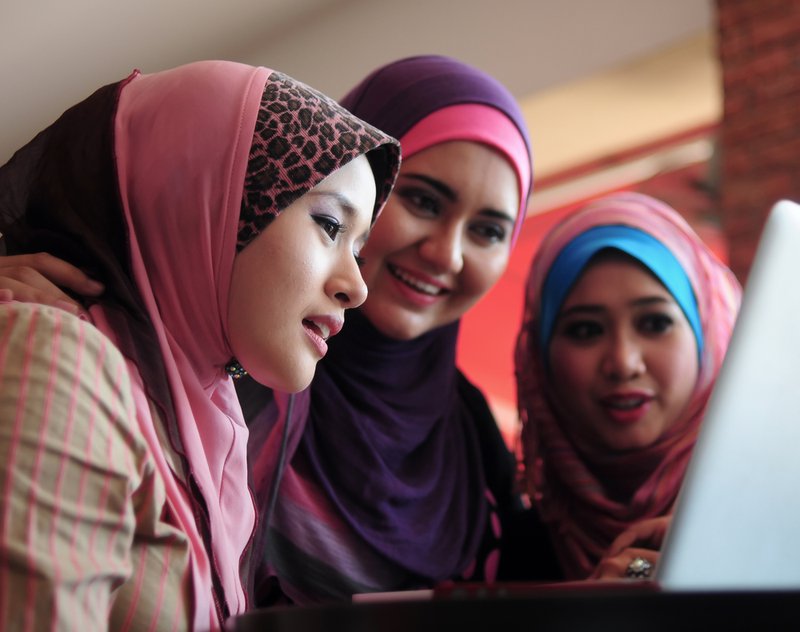Reclaiming Islam, Online and in Life
Weekly Article

April 28, 2016
Muslims have faced an onslaught of 'anti-Muslim' discrimination from the media, certain government policies, and even their fellow citizens for the past fifteen years. Muslims have had their religious and Western identities not only questioned, but also pitted against each other, as if the two are mutually exclusive. Many young, Western Muslims feel increasingly isolated and antagonized.
The media has had a huge and unforgivable role in normalizing this anti-Muslim sentiment. Right wing media outlets with large audiences continually give their platform to so-called experts in terrorism and extremism, one of whom infamously stated that Birmingham, UK was a city “where non-Muslims simply don’t go in.” Perhaps worse than these blatant lies is the bias that under-reports positive stories concerning Muslims (such as a Shia mosque in Bradford that had sectarian graffiti put on it by Sunnis—and in response, the mosque held a unity Iftar that was attended by both Shias and Sunnis as a statement of unity and brotherhood in the face of hatred—the graffiti was much more widely reported than the Iftar), or the bias that reports instances of violence perpetrated by Muslims as terrorism and religious extremism, but the shooting of a Planned Parenthood by a white man as an isolated incident of mental illness. This has all given rise to a feeling of alienation and victimization. Islam and being Muslim has now become synonymous with terrorism and being an extremist. This is a narrative we want to change, not to convince non-Muslims, or to take back our religion, but because this is our own story, and we’re the ones who get to tell it.
To be clear, the stories told about us matter, too. There has also been a fixation on Muslims in political discourse and in government policy. Racial and religious profiling has become commonplace, especially when traveling abroad. And it’s our strong belief that what starts sounding in the media and official policy echoes in society more broadly. Reports indicate there has been a ‘sharp rise’ in Islamophobic incidents since the 2015 Paris and San Bernardino terror attacks. These attacks were tragedies, but they were not carried out by ordinary Muslims, and ordinary Muslims shouldn’t have to explain that.
But we are. Following every terrorist attack, Muslims are asked to condemn and to “do more” to tackle extremism, a routine with which we Muslims have become all too familiar. Our ongoing and increasing efforts go unheard, despite the fact that Muslims from Europe to America have all risen to the challenge to do more to establish community cohesion and to ease the anxieties of their fellow citizens at ease. And while Muslims feel vilified and attacked in the West, they are also the biggest victims of terror at the hands of extremist groups in the East. Thousands of Muslims have been killed by the likes of al-Qaeda and ISIS. Meanwhile, Muslims across the world are engaged in an ideological battle against extremists.
Despite the odds, young Muslims across the West are stepping up to tackle the demonization of their faith head-on. To take back our story, online and in life. Be it directly through attending Trump rallies in protest or mobilizing on social media, a new breed of young Muslims will identify with the rise of a fresh and resilient Muslim identity which celebrates their diversity and acknowledges their ability to speak back. For our part, in the summer of 2014, we decided to create a project that would reclaim the narrative for Muslims in the West and champion the formation of a strong, Western Muslim identity. It is in this very spirit that we brought The Muslim Vibe to life.
Ours is a platform that attempts to give Western Muslims a space to share their experiences and reclaim Islam from extremists on both sides who have manipulated it. This will not only counter extremism, but also help inform our non-Muslim fellow citizens about Islam. The Muslim Vibe seeks to increase political engagement and to empower Western Muslims by highlighting issues neglected by the mainstream media. Through a more robust representation of Islam (for example, this piece on Britain’s Muslim comedy revolution), we seek to address extremist ideologies within the community, and encourage peaceful activism to tackle increasing anti-Islamic sentiment within society.
Furthermore, we aim to address social issues that are often taboo subjects that affect both Muslims and non-Muslims—such as homosexuality, depression, and disability—through honest and open discussion. We are actively seeking to explore the possibility of creating a new culture for Western Muslims that fuses their ‘Western’ identity with their religious one.
Last but not least, by focusing on issues of religious practice, we want young Muslims to understand their religion better and become ambassadors of their faith through their good deeds. A deeper and firmer understanding of Islamic principles amongst the youth will breed a generation of Muslims ready and able to serve the society they live in and give back in a meaningful and lasting way, not in spite of Islam, but because of it.
On both ends of the spectrum, opportunists have preyed on Islam for their own political purposes. It’s time for us—for Muslims—to reclaim our religion and explore our unique Western Muslim identity, one that we must forge by and, most importantly, for ourselves. Through the emergence of new media, connected by an empowering sense of duty, we are stronger now more than ever.